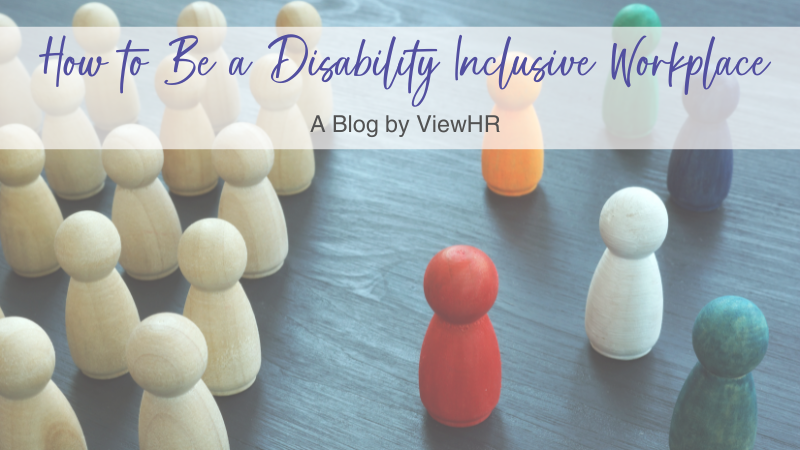Drop off your CV
We serve the global HR community through our offices located in Delhi, Hong Kong, London, New York, São Paulo and Singapore and have placed HR leaders in over 30 countries.
Embracing and becoming a disability inclusive workplace can not only positively impact those...

Embracing and becoming a disability inclusive workplace can not only positively impact those with disabilities but also everyone in the business. Adjustments that are made not only support those disabled colleagues but can also benefit every employee. In order to become disability inclusive, organisations must adopt an initiative-taking approach that fosters an accessible and equal environment for all.
In 2023, the [1] GOV.UK reported that there are 5.1 million disabled people in employment in the UK, which equates to 1 in 4 of the working age population are classed as disabled.
So, where should organisations begin?
Understand Legal Obligations
Organisations are obliged to adhere to the provisions of the Equality Act 2010, which requires them to implement reasonable adjustments for disabled individuals preventing them from any disadvantage in the workplace. This can include physical accessibility, flexible working provisions and adjustments to the recruitment process.
Recruitment
Organisations should effectively encourage and identify new talent in an inclusive way – this can be through various channels to advertise vacancies which aids the steady flow of new employees, be creative in the way you advertise ensure that all job advertisements are accessible, offer flexible application methods, you could partner with relevant organisations that support under represented groups, you could attend diverse job fairs or even advertise in publications and on platforms that reach a varied audience.
Within your recruitment practices, you may wish to consider exploring the following:
Be mindful to think about barriers and adjustments that might exist before you start the recruitment process – you may need to adjust at each stage to ensure all candidates have the opportunity to demonstrate their abilities.
Programmes such as[2] The Disability Confident Scheme was set up by the Government to create a movement of change, encouraging employers to think differently about disability and to take action to improve how they recruit, retain, and develop disable people.
Awareness, Education & Training
In order to help to foster and facilitate an inclusive culture you may wish to consider educating your existing workforce on disability awareness, inclusive practices, and the importance of accessibility for all, many organisations promote disability inclusion training along with unconscious bias particularly around recruitment.
Any organisation needs to be ready to think differently about developing a long-term strategy to ensure that disability inclusivity is a long-term initiative and not just a short-term gain. Scope UK[3] highlight that disabled people are still being stereotyped in all aspects of their daily lives and that as such negative attitudes have trebled in the past 20 years.
By giving employees an understanding and awareness of disability it will allow employees to understand disability better, change and challenge the way in which they talk about disabilities, expel negative stereotypes, and help employees to find ways to support each other in the workplace.
Management in any organisation play an important part in the recruitment, management, and development of their teams and as such ensuring that line managers are equipped to manage all employees regardless of their ability is an important part of developing inclusivity within the workplace.
Reasonable Adjustments
Organisations should conduct regular audits of their premises to ensure that all aspects are accessible to people with physical disabilities, some reasonable adjustments may include installing ramps, widening doorways, and providing clear signage with braille. There are other adjustments that may need to be considered such as ergonomic furniture, assistive technology (such as screen readers or even speech recognition software) along with flexible working or even adjusted duties to accommodate an employee’s needs.
It is important to remember that these adjustments may benefit and may also be useful for those employees who are not disabled, many adjustments do not cost anything and can be implemented easily in any organisation. It is also important to not make assumptions about an individual’s abilities or requirements, some people with a disability or long-term health condition do not require any adjustments.
Organisation Culture
The culture of any organisation plays a significant role in employee satisfaction and engagement, when fostering an inclusive working environment, the organisation’s culture has never been more important to get right.
All employees regardless of their abilities should feel comfortable speaking to management and raising concerns that they may have. For those disabled employees it is equally important for them to feel comfortable in discussing their needs and concerns, not only once they are employed, but at the start of the employee lifecycle at the recruitment stage also.
Organisations could also look to establish Employee Resource Groups (ERG’s) to provide a forum for disabled employees for peer support and advocacy. Engaging with disability-focused organisations or charities, can offer businesses valuable guidance, support, and access to best practices. Establishing partnerships with organisations such as Scope, the Business Disability Forum, or participating in the Disability Confident scheme as set up by the Government can provide organisations with essential resources and support for fostering long-term inclusion. Other helpful resource include Through Access to Work (https://www.gov.uk/access-to-work), providing grants and support to help individuals stay in work!
In summary, achieving disability inclusion in the UK requires legal compliance, cultural change, and sustained commitment to accessibility, fair recruitment, and workplace adjustments. An organisation should treat everyone within the organisation with respect regardless of their abilities.
These efforts not only benefit disabled employees but also help to contribute to a more diverse, productive, and innovative workforce all round.